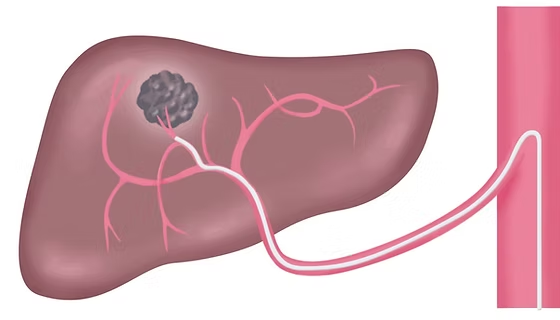
Liver Cancer Treatment-TACE
Liver cancer is the sixth most common cancer in India. Hepatocellular carcinoma (HCC) is the most common primary liver cancer. Many treatment options are available for treatment of HCC like liver transplant, RF ablation, Transarterial Chemoembolisation (TACE), Chemotherapy and immunotherapy.
In patients who are not candidates for liver transplant, Important treatment options include RF ablation or Microwave ablation (MWA), TACE and Immunotherapy.
For patients with Preserved liver functions – RF ablation, MWA and TACE are the preferred treatment options.
RFA and MWA ablation are used to treat small localised tumors whereas TACE is used for large and multinodular tumors.
Trans-Arterial Chemo-embolisation (TACE)
TACE is an advanced treatment for hepatocellular carcinoma (HCC), the most common form of liver cancer. This procedure is similar to angiography of the heart, except here we do angiography of your liver, select the vessel supplying the tumor and inject chemotherapeutic drug within the tumor. You will be discharged next day after the procedure.
Indications.
It is typically recommended for patients who are not candidates for surgery, liver transplantation, or other localized treatments, but still have a relatively preserved liver function. Your doctor will evaluate your blood tests, review your CT scan or MRI, do an USG and see whether you are fit to undergo TACE procedure.
Benefits
- No surgical scar
- Cheaper and less risky than conventional surgery
- Targeted Therapy: TACE delivers chemotherapy directly to the tumor via the blood vessels that feed it, maximizing the concentration of drugs where they are most needed while minimizing systemic side effects.
- Minimally Invasive: The procedure is performed through a small catheter, often without a surgical scar
- Short Hospital Stay- Since it is a minimally invasive procedure, the total duration of hospital stay is only 2-3 days including admission, work-up, procedure and discharge.
- Complementary Treatment: It can be used alongside other therapies, such as systemic Chemotherapy, Immunotherapy, Radiotherapy (SBRT) or liver transplantation, to enhance overall treatment outcomes.
Procedure Details
The procedure is done in a cath lab after adequate fasting and involves a catheter being inserted through the groin and advanced to the liver’s arteries. Chemotherapy drugs are then administered directly to the tumor. The total duration of procedure varies from 1-2 hours depending on the number of tumors. TACE can be repeated over several sessions, depending on the patient’s response and the tumor’s characteristics. Patients are typically monitored closely for any side effects and response to treatment.
What will happen after the procedure.
You will be shifted to the recovery to monitor your vitals for any immediate post procedure complications. Once you are stable and pain-free, you’ll be shifted to your room. You have lie still for 12 hours after the procedure to prevent chances of bleeding from groin. You might feel little pain in the abdomen on the day of the procedure due to the chemotherapy being given in your liver tumor. Next day after reviewing your blood tests, you’ll be discharged once you are pain free. To see the treatment response, contrast CT scan or contrast MRI will be done after 1 month and on regular intervals thereafter to see recurrence of the lesion.
Why Choose Us?
With extensive expertise in hepatocellular carcinoma management, we offer personalized care that prioritizes your unique needs. Being trained in India best Hospitals viz. AIIMS, New Delhi, PGI Chandigarh and ILBS, New Delhi, Dr Rishabh Jain and team provides you with the best possible chance for tumor control, improved outcomes, and a faster recovery. Let’s work together to fight HCC with a treatment plan tailored just for you.

